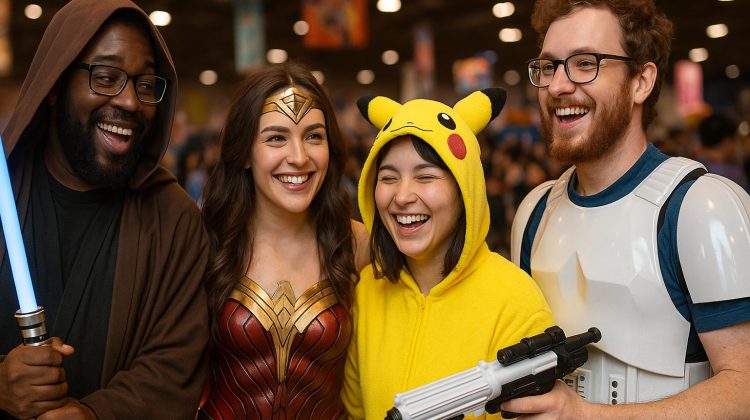
Every geek, collector, or die-hard fan knows the feeling: the thrill of a new release, the rush of meeting others who “get it,” and the strange emotional attachment to fictional characters or worlds that don’t technically exist. But there’s more going on here than just “liking stuff.” Fandom taps into deep psychological currents — from identity and belonging to the human brain’s reward system.
Fandom as Identity Armor
When you put on a Starfleet uniform or display your vintage Star Wars figures, you’re not just showing off a hobby — you’re broadcasting a piece of your identity. Psychologists call this social identity theory: we define ourselves, in part, by the groups we belong to. Being “a Marvel fan” or “a Potterhead” becomes a kind of shorthand for values, tastes, and even moral compass.
The Brain Chemistry of Being a Fan
When your favorite franchise drops a trailer, your brain floods with dopamine — the same chemical that fuels excitement when you anticipate a reward. According to Lynn Zubernis Ph.D., “Being a fan is, for many people, a source of repeated positive experiences. Becoming a fan has often been compared to falling in love, because it can produce similar emotions of euphoria and a strong desire to see or interact with the celebrity or media or activity in some way.“1
Watching, discussing, and theorizing with other fans can also trigger oxytocin, the “bonding” hormone. That’s why community watch parties or fan conventions feel so good: they’re basically neurochemical high-fives.
Why Shared Passion Feels Like Home
Humans are wired to seek connection. Fandom communities — whether on Reddit, at Comic-Con, or in a Discord server — offer a ready-made tribe. This is especially powerful in an age where geographic boundaries matter less than shared passion. For many, fandom isn’t just a pastime; it’s the safest place to be fully themselves.
The Shadow Side of Devotion
Passionate communities can become insular or even hostile toward outsiders. The same deep identification that bonds fans can also lead to gatekeeping, toxic behavior, or “purity tests” about who’s a “real fan.” Understanding this helps communities self-police and foster inclusivity rather than exclusion.
Fandom in the Digital Age
Streaming, social media, and fan-driven platforms like Kickstarter have shifted the power dynamic. Fans can now influence storylines, bring canceled shows back to life, or directly fund spin-offs and indie projects. This level of influence would’ve been unthinkable in the era when fandom meant writing letters to a studio.
The Infinite Feedback Loop
Fandom fuels media, which fuels fandom, creating a cycle that’s both commercially powerful and emotionally rewarding. You buy merch, the studio funds more content, your love deepens, and the cycle repeats. The best part? Unlike other loops in life, this one feels like play.
Love, Actually (For Fictional Worlds)
Ultimately, fandom is about joy — about finding your people, feeling understood, and immersing yourself in worlds that light you up inside. Whether you’re cosplaying at a con or live-tweeting an episode premiere, you’re participating in a uniquely human ritual: celebrating what you love with others who love it too.
TL;DR
When that trailer drops, your brain is lighting up with dopamine because it’s wired to thrill to anticipation. When you gather with fellow fans—even virtually—your oxytocin kicks in to turn nerdy passion into real emotional bonding. Neurochemistry never looked this fun.
- Anticipation Is Part of Being a Fan, and That’s a Good Thing, Lynn Zubernis Ph.D., Psychology Today ↩︎
[…] explored in the psychology of fandom, our bond to stories deepens when we can experience them as they were created. Language isn’t […]